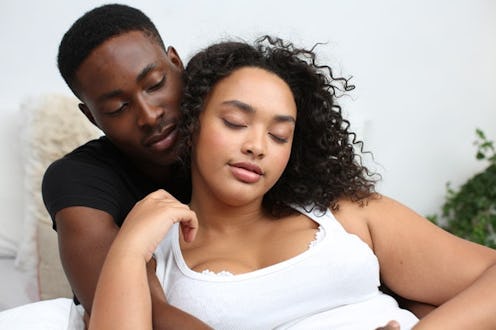
There are a lot of different ways relationship problems can manifest, but codependency can be a particularly tricky one to handle. If you realize your partner is codependent, the solution isn't as simple as spending less time together or just helping them get a hobby — codependency is a problem with much deeper roots.
"Codependency has become a buzzword, and people sometimes misunderstand what it means to be codependent..." Holly Daniels, PhD, LMFT, clinical systems director at Sober College, tells Bustle. Now, being codependent isn't just about spending too much time together or relying on each other. It's normal to lean on someone you're in a relationship with. But if you realize that your partner puts your relationship above everything, that can be dangerous. "Humans are biologically wired to be in relationships, and relationships work best when two people are able to trust one another, lean on one another, and comfort one another," Daniels explains. "In a healthy relationship, there is a balance between each partner’s ability to be independent and their ability to enjoy mutual support with the other partner. In some relationships, however, one or both partners value the relationship much more than they value their own health and well-being. This is called codependence."
And it can be a scary thing to realize that your partner is codependent — it puts a lot of pressure on you. You might notice that they seem obsessed with making you happy, that they put all of their energy into the relationship, or that they constantly fear you're going to break up with them at any moment. If they're putting you and your relationship above their own happiness, there's a problem.
But what can you do? It's a delicate situation, because you want your partner to be happy but you also know they need to be independent and healthy, too. Here's how to approach it, according to an expert.
Acknowledge Your Role In It
Even if you think your partner is the codependent one, there's a chance that you've also had a role in the relationship getting this far — and that means that you've enabled their codependency, even if you didn't realize it. So even if you feel like you have a healthy amount of independence, if you realize that your partner is putting too much into you or into the relationship, it's time to look at your role.
Maybe you liked being the center of someone's world, maybe it made you feel safe, or maybe you just like taking care of someone — but you need to be honest with yourself. It will give you a better understanding of the situation and allow you to talk to your partner with more compassion. You can talk about what both of you struggle with, rather than just pointing out their issues.
Talk To Your Partner
Once you're willing to admit your role in it, you need to talk to your partner — but be prepared that they may not realize (or want to admit) that they're codependent.
"If you find yourself in a codependent relationship, the most important thing to do is talk to your partner about it!" Daniels says. "Set aside a time to talk away from distractions, and open up a dialogue about your concerns. If your partner gets super defensive or avoids having the conversation at all, this is a sign that you are indeed in a codependent relationship."
But no matter how much they resist, it's a conversation that needs to happen. If you feel like you can't come up with strategies to get your partner to put themselves first — or if your partner won't listen — don't hesitate to seek out a couple's counselor. As Daniels says, their inability to talk about the issue a sign that they may really have an unhealthy dependency on the relationship.
Be Honest And Assess If The Relationship Is Working
Ultimately, if your partner has an unhealthy attitude and is dependent upon you, you might have to decide whether or not this relationship is healthy for them.
"Sometimes you’ll find yourself with a partner that refuses to have an open conversation in any setting," Daniels says. "In that case, you might have to cut your losses and move on." If you don't think your partner can have a healthy relationship with you, you might have to be the stronger one and give them a chance to work through their underlying issues.
Realizing that your partner is codependent can be tough because it can make you feel stuck. But it's important to remember that you aren't stuck. Keep their best interests in mind, figure out your role in the situation, and talk to them. You both deserve to be healthy and happy.